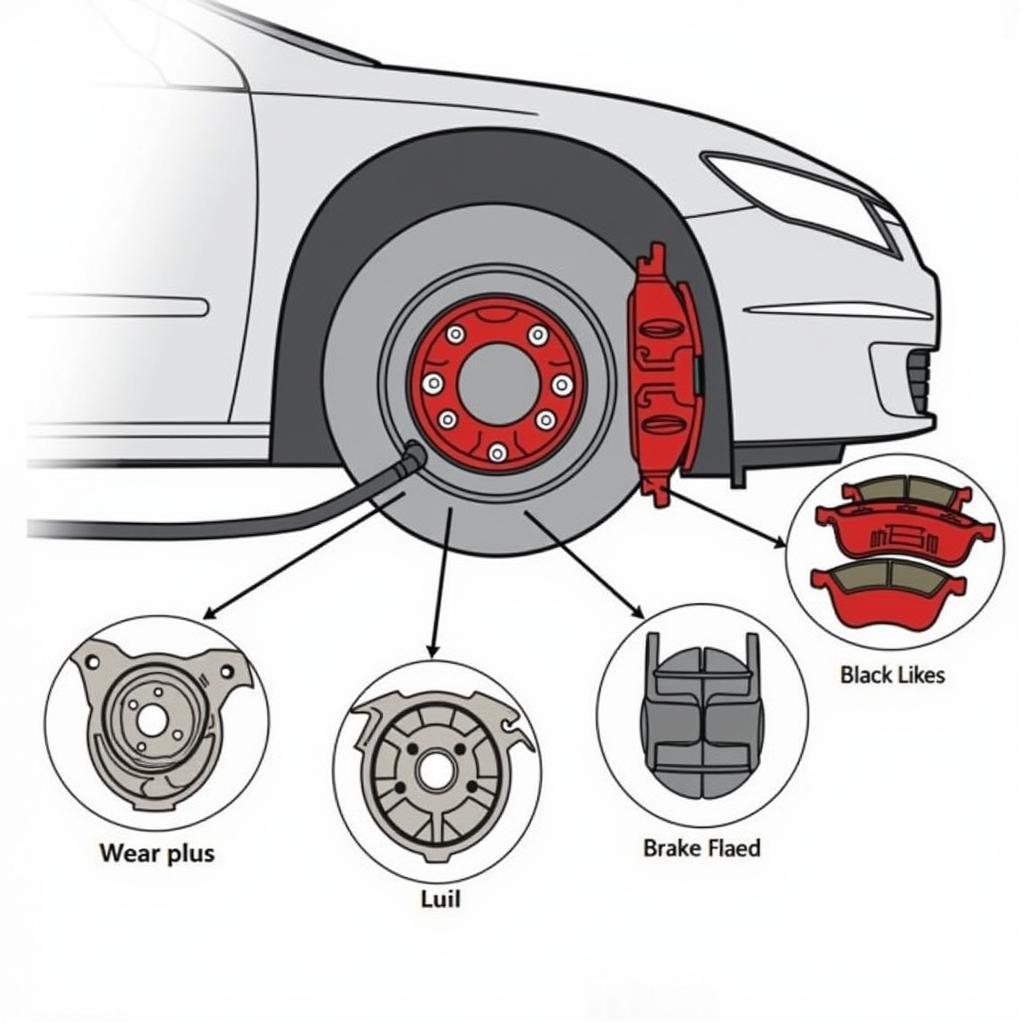Maintaining your car is crucial not only for its longevity but also for your safety and wallet. Understanding the key Maintenance Items Of A Car can save you from costly repairs down the road and ensure a smooth, reliable driving experience. This guide will cover everything you need to know about car maintenance, from routine checks to more complex procedures. We’ll delve into why these maintenance items are important, when they should be performed, and even offer tips for those who prefer the DIY approach.
Knowing the right regular car maintenance items can make all the difference. Neglecting these essential tasks can lead to decreased fuel efficiency, compromised safety, and ultimately, a shorter lifespan for your vehicle.
Understanding Your Car’s Vital Maintenance Items
Just like our bodies require regular checkups, our cars also need consistent attention to ensure optimal performance. Understanding what these maintenance items of a car are is the first step towards a proactive approach to car care. This proactive approach can prevent small issues from escalating into major, expensive problems.
Fluids: The Life Blood of Your Vehicle
Regular fluid checks and changes are fundamental to the smooth operation of your vehicle. Engine oil, coolant, brake fluid, power steering fluid, and transmission fluid all play critical roles and require periodic attention.
- Engine Oil: This lubricant keeps the engine’s moving parts working smoothly. Low oil levels can lead to increased friction and engine damage. Regular oil changes, as specified in your owner’s manual, are essential.
- Coolant: This fluid regulates the engine’s temperature, preventing overheating. Check the coolant level regularly and ensure it’s within the recommended range.
- Brake Fluid: This fluid transmits the force from your foot to the brakes, allowing you to stop safely. Low brake fluid can significantly reduce braking performance.
- Power Steering Fluid: This fluid makes steering easier. Regular checks and top-ups are necessary to maintain smooth steering.
- Transmission Fluid: This fluid lubricates and cools the transmission. Regular changes, as recommended by the manufacturer, are crucial for optimal transmission performance.
Filters: Keeping Your Car Clean Inside and Out
Filters play a crucial role in protecting your car’s engine and ensuring clean air inside the cabin. These maintenance items of a car are often overlooked but are essential for optimal performance and a healthy driving environment.
- Air Filter: This filter cleans the air entering the engine, preventing dirt and debris from causing damage.
- Cabin Air Filter: This filter cleans the air entering the cabin, removing pollen, dust, and other pollutants.
- Fuel Filter: This filter cleans the fuel, preventing contaminants from reaching the engine.
Regularly replacing these filters can improve fuel efficiency, engine performance, and air quality inside the car.
Tires: Your Connection to the Road
Tires are arguably the most important safety feature on your car. Maintaining proper tire pressure and regular rotation are essential for safe handling, optimal fuel efficiency, and extended tire life.
- Tire Pressure: Check your tire pressure regularly using a tire pressure gauge. Proper inflation ensures even tire wear and optimal handling.
- Tire Rotation: Regularly rotating your tires ensures even wear and extends their lifespan. Consult your owner’s manual for the recommended rotation schedule.
“Regular tire maintenance is often overlooked, but it’s one of the simplest and most effective ways to ensure safety and improve fuel economy,” says John Miller, a certified automotive technician with over 20 years of experience.
critical maintenance items for cars over 100 000 miles become even more critical as your car ages.
Brakes: Stopping Power You Can Rely On
Your brakes are your car’s most critical safety system. Regular inspections and maintenance are essential for ensuring reliable stopping power.
- Brake Pads and Rotors: These components wear down over time and need to be replaced periodically.
- Brake Fluid: As mentioned earlier, maintaining the correct brake fluid level is crucial for optimal braking performance.
 Inspecting Car Brake System
Inspecting Car Brake System
Regular Maintenance Schedule: A Proactive Approach
Creating and adhering to a regular maintenance schedule is the best way to keep your car in top condition. Consult your owner’s manual for the manufacturer’s recommended maintenance intervals.
regular maintenance item on car will help you avoid costly repairs in the future. A regular maintenance schedule includes tasks like oil changes, filter replacements, fluid checks, and tire rotations. Sticking to this schedule will prolong the life of your car and ensure a safe and reliable driving experience.
“Preventive maintenance is always cheaper than reactive repairs. A little bit of regular care can go a long way in saving you money and headaches down the road,” advises Sarah Johnson, a lead mechanic at a reputable auto repair shop.
important car maintenance items should never be neglected.
Conclusion
Understanding the key maintenance items of a car is essential for every car owner. By following a regular maintenance schedule and addressing potential issues promptly, you can extend the life of your vehicle, enhance its performance, and ensure your safety on the road. Remember, proactive maintenance is always better than reactive repairs. For any assistance or further information, feel free to connect with us at AutoTipPro. Call us at +1 (641) 206-8880 or visit our office at 500 N St Mary’s St, San Antonio, TX 78205, United States.
detailed car maintenance items can give you a deeper understanding of the intricacies of your vehicle’s systems.




Leave a Reply